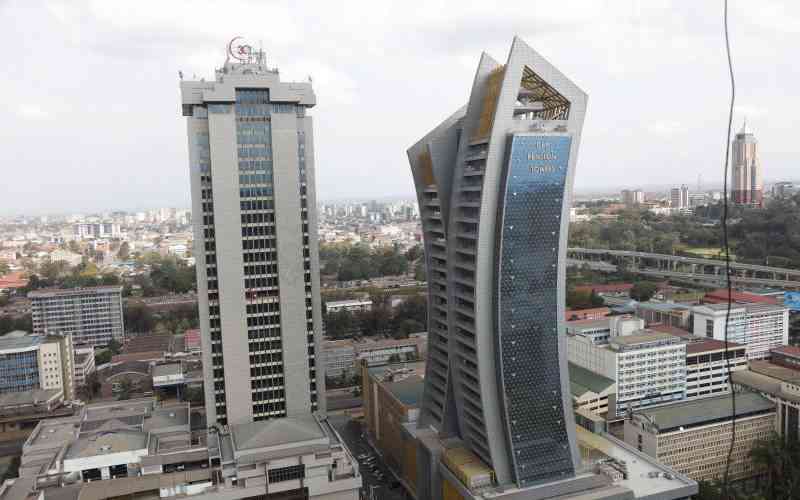Finance Bill 2025 will trigger a spike in cost of goods, experts say
Business
By
Macharia Kamau
| May 02, 2025

The National Treasury appears unsure how to go about this year's Finance Bill following last year's events that saw Kenyans stage countrywide protests to oppose the additional tax measures contained in the 2024 Money Bill.
The protests even forced President William Ruto not to assent to it. In the Finance Bill 2025, tabled in Parliament on Wednesday, the Treasury has avoided proposing new tax measures and instead has attempted to reform tax administration, with a key feature being the review of products that are VAT zero-rated by moving them to the list of VAT-exempt goods.
The Treasury has been seeking to stop abuse of VAT zero-rating, which has in the past resulted in huge and at times undeserving VAT refund claims.
Among the major proposals in the Finance Bill include the migration from the list of zero rated items to that of VAT exempt goods such items as inputs used by pharmaceutical manufacturers to produce medicaments, transportation of sugarcane from farms to milling factories, motorcycles, electric bicycles, solar and lithium ion batteries, electric buses, raw materials for manufacture of animal feeds and bioethanol vapour (BEV) stoves.
READ MORE
At least 14 soldiers killed in South Sudan as 'love triangle' turns bloody
KCB Group commits Sh53b to green finance projects
Safaricom banks on innovation as it launches 2025 sustainability report
KMPDU slams governors over remarks on Kiambu infant deaths
IG Kanja orders investigation into CHAN allowance misuse saga
Music mogul Sean 'Diddy' Combs sentenced to more than four years in prison
How 14 family members died in trip to visit sick aunt
Why Kenya's next medal should be in geothermal power sector
While largely avoiding new taxes in the Finance Bill 2025, migrating zero-rated goods to the VAT-exempt list might spark a wave of new hikes on prices of goods as firms pass on the higher costs to consumers.
In explaining the different VAT exempt and zero-rated, analysts note that zero-rated supplies are cheaper as manufacturers are allowed to claim a refund on input tax. Exempt supplies, on the other hand, are not taxable and any related input tax is therefore not deductible.
"There has been an attempt to focus more on businesses this year. Many items have been moved from zero rating to tax-exempt.... This will increase the business costs, which will eventually be passed on to consumers and slow down the economy," said Ken Gichinga, Chief Economist at Mentoria Economics.
"When items are zero-rated, it means producers can claim a tax refund and items are cheaper. When they are exempt, it means producers cannot claim refunds, which means they have to pass it on to customers and reduce other expenses such as workforce."
Treasury has also proposed the removal of certain goods from the list of VAT-exempt supplies, which will attract VAT at the standard rate of 16 per cent if the proposals sail through as they are. These include taxable goods for use in the construction of tourism facilities and goods for the construction and equipping of specialised hospitals with a minimum bed capacity of fifty.
The government had in 2020 exempted goods used on the construction of tourism facilities, including hotels, conference facilities and recreational parks as it sought to resuscitate the industry that was at the time suffering from the effects of Covid-19.
It had also VAT exempted locally assembled vehicles used for transportation of tourists, which the Finance Bill 2025 has proposed to take away, which will mean tour vans and other vehicles will attract VAT at 16 per cent.
Also hit are aviation sector players, where equipment such as "direction-finding compasses, instruments and appliances for aircraft" are proposed to be struck off the list of VAT exempt items.
Goods supplied for implementation of official aid funded projects are exempt but the finance bill proposes to exclude "fuel, lubricants and tyres for vehicles" being used in the implementation of such projects from being VAT exempt, a move that could make implementation of donor funded projects more expensive.
The government has been making attempts to calm Kenyans following last year's protests that were led by Gen Zs, which turned chaotic as police unleashed what has been termed as brutal force and left dozens dead and hundreds nursing serious injuries.
The Cabinet, which earlier this week approved the Finance Bill, assured that it had no tax new tax measures and instead said it had revised overall spending downwards as it sought to reduce the budget deficit. It noted that this year's finance bill would focus on closing loopholes and enhancing efficiency, including addressing loopholes related to tax expenditures that have historically been exploited to siphon funds from public coffers. These are through inflated tax refund claims.
"Instead, it (the Finance Bill) aims to enhance tax administration efficiency through a new legislative framework. Key provisions include streamlining tax refund processes, sealing legal gaps that delay revenue collection, and reducing tax disputes by amending the Income Tax Act, VAT Act, Excise Duty Act, and the Tax Procedures Act," said the Cabinet in a dispatch on Tuesday.
The Bill proposes critical changes to support small businesses, allowing them to fully deduct the cost of everyday tools and equipment in the year of purchase, thereby eliminating unnecessary delays in accessing tax relief.
"In fact, its provisions are designed to offer targeted relief to businesses and workers, and to support the spirit of enterprise and productivity," said President William Ruto, while addressing workers during Labour Day celebrations.
"Notably, to improve workers' take-home pay, employers will now be required to apply eligible tax reliefs and exemptions directly when calculating Pay As You Earn (PAYE), a significant shift from the current system where such reliefs can only be claimed from the Kenya Revenue Authority. This will increase efficiency and immediately benefit employees," he said.
"Additionally, all pensions and gratuity payments for both the public and private sectors will now be tax-exempt. This reform is a recognition of the service and sacrifice of our senior citizens and workers, and a step toward ensuring that retirement is met with dignity, not distress, the President added.

